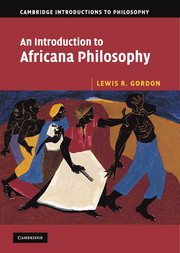Conclusion
Published online by Cambridge University Press: 05 June 2012
Summary
It is impossible to cover every dimension of so vast an area of thought as Africana philosophy in one volume. It is my hope that the explorations and reflections in this book have offered the reader some insight into this important field of study. At its core is the paradox of reason, that reason must be able to evaluate itself, which means it must transcend itself.
That we cannot control all of the conditions through which and by which reason is manifested does not mean we should abandon it. Wilhelm Amo, Ottobah Cugoano, Anténor Firmin, W. E. B. Du Bois, Anna Julia Cooper, Frantz Fanon, and Steve Bantu Biko understood this. They knew that the misuse of rationality does not entail the elimination of activities that enable us to meet each other with dignity and respect. Thinking and language, resources of the mind made concrete in a social world rich in symbolic meaning, have brought much to our species in, from the standpoint of the cosmos, not even a blink in the unfolding of time. Africana philosophy is one of those resources, one born, as Leonard Harris characterized its African-American line, of struggle.
Africana philosophy exemplifies what it means to do philosophy in a hostile world. Its practitioners are aware that, like Caliban in Shakespeare's Tempest, what they do, and sometimes they themselves, appear to the Prospero-inspired world of Eurocentric philosophy more as the production of beasts than creatures of reason. Yet there is an ironic dimension of this misrepresentation.
- Type
- Chapter
- Information
- An Introduction to Africana Philosophy , pp. 249 - 250Publisher: Cambridge University PressPrint publication year: 2008

